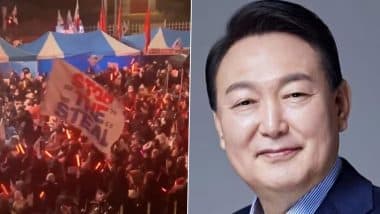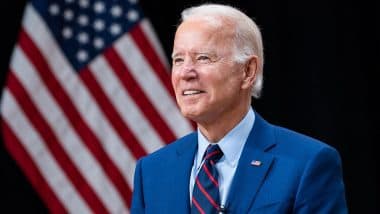Seoul, January 15: South Korea's impeached President Yoon Suk Yeol was detained in a massive law enforcement operation at the presidential compound on Wednesday morning, saying he complied with the warrant after weeks of defiance over attempts to question him in the investigation over his imposition of martial law last month. In a video message recorded before he was escorted to the headquarters of the anti-corruption agency, Yoon lamented that the "rule of law has completely collapsed in this country". Yoon's lawyers tried to persuade investigators not to execute the detention warrant, saying the president would voluntarily appear for questioning but the agency declined.
The Corruption Investigation Office for High-Ranking Officials said Yoon was brought into custody about three hours after hundreds of law enforcement officers entered the residential compound in the agency's second attempt to detain him, this time without encountering meaningful resistance. A series of black SUVs, some equipped with sirens, were seen leaving the presidential compound with police escorts. A vehicle apparently carrying Yoon later arrived at the agency's office in the nearby city of Gwacheon. Yoon Suk Yeol Detained Over Martial Law Attempt, Becomes 1st Sitting South Korean President to Be Arrested.
Yoon had been holed up in the Hannam-dong residence in the capital, Seoul, for weeks while vowing to "fight to the end" against the efforts to oust him. He has justified his declaration of martial law December 3 as a legitimate act of governance against an "anti-state" opposition employing its legislative majority to thwart his agenda.
The anti-corruption agency is leading a joint investigation with police and the military over whether Yoon's martial law declaration amounted to an attempted rebellion and sought to bring him into custody after he ignored several summonses for questioning. They have pledged more forceful measures to detain him after the presidential security service blocked their initial efforts on January 3. South Korean Authorities Attempt to Arrest Impeached President Yoon Suk Yeol As Protesters Face Off With Police.
Following an hourslong standoff at the compound's gate, anti-corruption investigators and police officers were seen moving up the hilly compound. Police officers were earlier seen using ladders to climb over rows of buses placed by the presidential security service near the compound's entrance. Anti-corruption investigators and police later arrived in front of a metal gate with a gold presidential mark that's near Yoon's residential building. Some officers were seen entering a security door on the side of the metal gate, joined by one of Yoon's lawyers and his chief of staff. The presidential security service later removed a bus and other vehicles that had been parked tightly inside the gate as a barricade.
Despite a court warrant for Yoon's detention, the presidential security service insisted it's obligated to protect the impeached president and fortified the compound with barbed wire and rows of buses blocking paths. As tensions escalated, South Korea's acting leader, Deputy Prime Minister Choi Sang-mok, issued a statement early on Wednesday urging law enforcement and the presidential security service to ensure there are no "physical clashes".
Yoon Suk Yeol Detained
In South Korea, the President Yoon Suk Yeol declared martial law. Then the legislature overrode it. Then he got impeached. Now they’re trying to arrest him… and things are going south fast.
It’s worth pointing out that Yoon is seen as a conservative.pic.twitter.com/1Ie9rA3reB
— Jess Fields (@jessalanfields) January 14, 2025
The liberal opposition Democratic Party, which drove a legislative campaign that led to Yoon's impeachment on December 14, issued a statement calling for the presidential security service to stand down and cooperate with Yoon's detention. Lawmakers from Yoon's People Power Party held a rally near the presidential residence, decrying the efforts to detain him as unlawful. The National Police Agency has convened multiple meetings of field commanders in Seoul and nearby Gyeonggi province in recent days to plan their detainment efforts, and the size of those forces fuelled speculation that more than a thousand officers could be deployed in a possible multiday operation. The agency and police have openly warned that presidential bodyguards obstructing the execution of the warrant could be arrested.
Yoon's lawyers have claimed that the detainment warrant issued by the Seoul Western District Court was invalid. They cited a law that protects locations potentially linked to military secrets from search without the consent of the person in charge -- which would be Yoon. The court warrant for Yoon's detainment is valid through January 21. Yoon's supporters and critics have held competing protests near the residence -- one side vowing to protect him, the other calling for his imprisonment -- while thousands of police officers in yellow jackets closely monitored the tense situation.
Yoon declared martial law and deployed troops around the National Assembly on December 3. It lasted only hours before lawmakers managed to get through the blockade and vote to lift the measure. Yoon's presidential powers were suspended when the opposition-dominated assembly voted to impeach him on December 14, accusing him of rebellion. His fate now rests with the Constitutional Court, which has begun deliberating on whether to formally remove Yoon from office or reject the charges and reinstate him. The Constitutional Court held its first formal hearing in the case on Tuesday but the session lasted less than five minutes because Yoon refused to attend. The next hearing is set for Thursday, and the court will then proceed with the trial whether or not Yoon is there.













 Quickly
Quickly




















